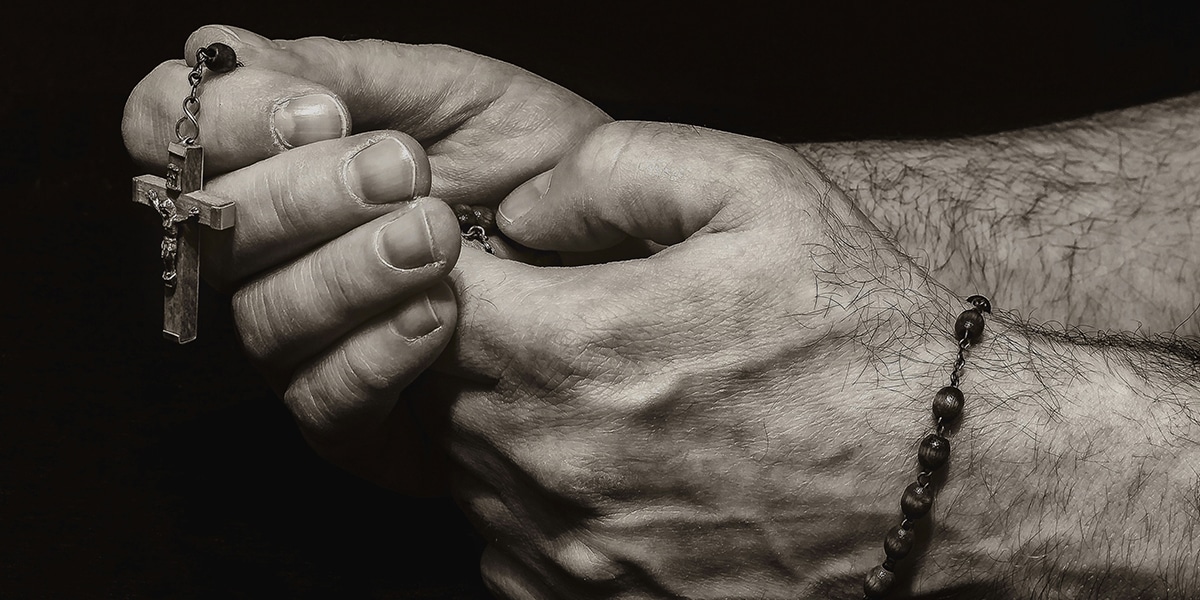A vibrant relationship with God requires us to own our emotions—even anger. Just ask Job and Abraham.
My older sister Patricia died of spina bifida before I was born. My younger sister Linda died of spina bifida when I was 3. Given that I was raised in a traditional, stoic, Irish-Catholic family, my sisters and their deaths were never talked about. In fact, I didn’t even know they existed until I was 5 and found their names in our family Bible. “Who are these people?” I asked my mother.
“They are your sisters.” That was all she said.
As I grew, I thought about them a lot. Eventually, I began to ask my mother why God did this to our family. She said simply that some crosses were heavier to carry than others. Somehow that answer and the related resignation didn’t work for me. And so I began to become angry. Specifically, I began to become angry with God.
For most of my youth, I felt this anger was wrong, sinful. Yet it didn’t go away. I encountered more and more suffering that did not make sense. A friend lost both his parents by the eighth grade. A very good priest dropped dead of a heart attack. The brother of a friend died in Vietnam.
As I began my work as a psychologist, I would touch on spiritual matters with my clients. I found that I was not alone in my anger. Worse, I met people whose explanations for tragedy were heartbreaking.
One woman, for example, believed that her prayers for a dying daughter did not work because her prayers were “not worthy of God’s attention.” Even my own father, as he dealt with a series of strokes, told me they were “punishment for my sins.” As I heard such struggles, I felt more and more that, because of anger, I was bound to grow away from my faith. Then I read the Book of Job.
Job: Not Merely Silent Suffering
Given that the Catholicism of my youth did not include a great deal of biblical study, I knew very little about Job other than the phrase “the patience of Job.” When I read this marvelous book, I realized among other things that Job was hardly patient. In fact, like me, he was angry!
The story of Job begins with a bet. Satan is arguing with God, saying that faith is easy when everything is going well in one’s life, but that people tend to lose that faith when times are tough. He then brings up Job, pointing out that Job has great faith but is also very comfortable and successful. But suppose, suggests Satan, that Job falls on hard times: Will he then be so faithful? God gives Satan permission to take away everything of Job’s but not to harm him. Satan does this, but Job holds on to his faith. So Satan ups the ante by asking God to let him harm Job directly.
And so Job ends up homeless, penniless, and afflicted with horrible skin diseases. He begins to seek an explanation from God. In fact, Job demands an explanation!
Job’s friends show up and offer standard explanations for his troubles. “You must have sinned,” suggests one. “You haven’t prayed hard enough,” says another. And yet Job continues his outcry, ultimately demanding that God show up and explain himself.
And God shows up! Granted, God tends to put Job in his place and never really answers Job’s “Why?” question. But the important points are that God shows up and that he never punishes Job for his outcry.
But Why, Lord?
I think the Book of Job is there to encourage us to embrace our outcries, not suppress them; and to struggle with the “Why?” question, not dismiss it. And so, somewhat timidly, I began to allow myself that anger.
It soon became clear to me that I needed to explore my anger at several levels. The most immediate level was the “Why?” question that was a large part of my youth. As I began to read, I found out that the “Why?” question has in fact given rise to a specific area of theological study called theodicy. Specifically, theodicy examines the issue of how an all-good, all-loving God can permit evil.
As I explored my anger, I came across the book May I Hate God? by Pierre Wolff. Despite its provocative title, this is a very gentle-spirited book that reminds us that God is a loving parent; and that loving parents, upon learning that their child is angry with them, want to hear about the anger—not necessarily condone it, but hear about it. This opened up to me the awareness that, when I am angry with God, my tendency is to express that anger in the same way I do at a human level. I shut down and use the “silent treatment.”
Novelist Joseph Heller put it another way in his novel God Knows. King David is reflecting on whether he is angry with God and concludes, “I’m not angry with God. We’re just not speaking to one another.” So it was with me and the God of my understanding.
In any case, Wolff’s book helped me to accept my anger. But I still struggled with the “Why?” question. Other thinkers offered helpful insights. Viktor Frankl did not answer this question, but he observed that, while we don’t always have a choice over what happens to us, we always have a choice regarding how we face it.
Similarly, Rabbi Harold Kushner, in his well-regarded When Bad Things Happen to Good People, offered what for me was a novel idea—that perhaps God wasn’t responsible for some of the bad things that happened to us.
At first, Kushner’s notion was comforting. Maybe God wasn’t behind my sisters’ illnesses or children with cancer or senseless random shootings. Maybe those things just happened. Somehow that thought made me fear God less. Yet the thought that perhaps God wasn’t behind all bad things that happened created another question articulated by Annie Dillard, who wrote in For the Time Being, “If God does not cause everything that happens, does God cause anything that happens? Is God completely out of the loop?”
My anger at God brought me to wrestle with some important issues. It challenged me to reexamine my image of God. Did I see God as punitive, misreading the Old Testament? Did I see him as loving, as in many New Testament stories? Did I see him as uninvolved, caring for the big picture and leaving the details to us, as the Oh, God! films suggest?
My anger also brought me face-to-face with my struggles about prayer. Does God answer prayers? Clearly not all prayers. It’s been said that there are many unanswered prayers at deathbeds. If God doesn’t answer all prayers, to follow Dillard, does he answer any prayers?
These struggles have been productive, prodding me toward a more mature understanding of God, as well as a more clear appreciation for prayer. But I still come face-to-face with my anger.
A Personal Encounter with God
Over the past few years, I have read the entire Bible three times. It has been a truly enlightening experience. I saw clearly that Job wasn’t the only one to argue with God. Abraham did it; Moses did it; even Jesus did it! I was in good company.
I saw, too, that David’s Psalms were at times outcries. Within the poetry, one can hear the oppressed poet yelling out to God, “Do something!”
I’ve learned from my many clients who sit and try to understand tragedies in their lives. In asking these great teachers, “Are you angry with God?” I’ve heard many instructive answers. One woman wrestling with a lifethreatening illness said, “Of course I’m angry with God! But he’s God. He can take it!” Another very spiritual young woman observed, “No, I’m not angry. But I sure would like to have a peek at his operations manual.”
Harold Kushner recently published a piece on the Book of Job titled The Book of Job: When Bad Things Happened to a Good Person. It is a literate and scholarly book that offered me a new note of comfort. Kushner suggests that Job is comforted and consoled not so much by God’s explanation but by the encounter itself.
Job deeply experienced God’s presence and took comfort in that meaningful experience. I found a note of personal truth in this thought. I realized that, yes, I’ve had meaningful encounters with God in nature or in the world of great art or in the sound of my grandchildren’s laughter.
But I realized that I have also encountered God in my anger in a way that has been profound. As I voice that anger, I feel God in a manner as profound as, albeit different from, my experience of God in nature.
The story of this journey of anger has a more recent turn to it, one with which I am still dealing. I recently saw an episode of The West Wing, a program from the early 2000s starring Martin Sheen as a fictional president. Prior to this episode, the president had lost a much-loved secretary in a senseless car accident. After the funeral, he stands alone in the National Cathedral and unleashes an anger that shocked me. As an example, his character refers to God as a “vengeful thug.”
I felt I’d long validated the importance of anger in my relationship with God, yet I found myself uncomfortable with the intensity of President Bartlett’s anger. But, upon reflection, I understood it. My anger is more than annoyance or disappointment—at times it is rage. Yet, out of fear, I withhold that rage and instead, like David in Heller’s novel, stop talking to my God or at least temper my feelings. Yet, when I allow myself to approach that rage, I find God waiting for me.
And so I come face-to-face with the God of my understanding. Is that God a vengeful parent who will not tolerate my anger and will punish me for speaking up? Such was the God of my youth. Or is the God of my understanding a loving God willing to wrestle with me, willing to accept my vented rage in the name of open, ongoing dialogue and genuine encounter? And do I have the courage to fully embrace this understanding of God and remain in dialogue in the midst of my rage?
The great Jewish scholar Abraham Joshua Heschel once wrote, “God stands in a passionate relationship with Man.” Anyone who has lived in a longterm, passionate relationship learns that passion is a package deal. You can’t have the joy and ecstasy unless you also accept and embrace the anger and alienation. I’ve dealt with several couples who say they don’t fight. But they are in my office because their relationship is stagnant. Without the struggle, there is no passionate intimacy.
The Path of Relationship
I realize at this point that, for me to have a joyful, peaceful, vibrant relationship with the God of my understanding, I must also embrace the rage. Not just annoyance, but rage!
And so, as I struggle, I return to reflect on my mother’s faith in the face of tragedy. I see that her faith was not some passive, shoulder-shrugging, “Oh well, it could be worse” type of faith. Throughout her life, she believed not only in the power of prayer but also in the persistence of that prayer. Like the woman in the parable seeking justice, she would not quietly plead or go away. Rather, she would “storm heaven with prayers.” Nor did she let tragic loss engender cynicism: on her deathbed and with absolute certainty and joyful anticipation, she said, “I’m going to see my girls.”
And yet I know my path is one of wrestling and arguing. It occurs to me that perhaps within the mystical body of Christ, we both play a part. People like my mother indeed inspire me to not lose hope and to continue to believe that understanding God’s mysterious way is possible.
But perhaps people like me—the questioners, the wrestlers—help others not to lapse into passive, depressed resignation. Perhaps in encouraging others to “fight back,” we help them experience real encounters with God. Perhaps we wrestlers help others to hope that our pain and anguish do matter. And perhaps together we can link arms and sing those words of Job offered not as an answer but in hopeful expectation: “The Lord gave and the Lord has taken away; blessed be the name of the Lord!”








